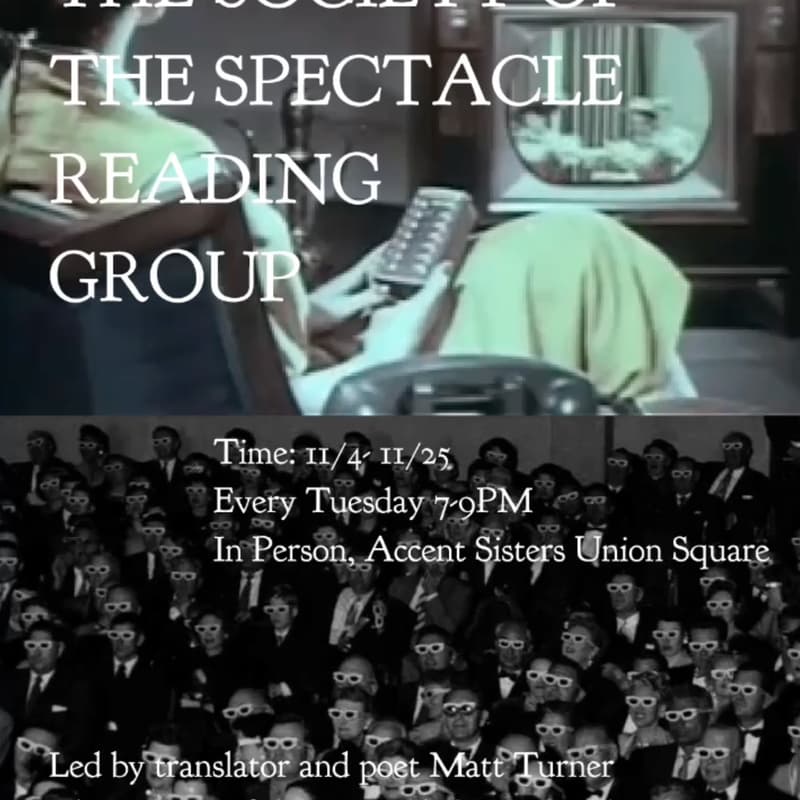

THE SOCIETY OF THE SPECTACLE READING GROUP
"All that was once directly lived has become mere representation."
Time: 11/4- 11/25
Every Tuesday 7-9PM
In Person, Accent Sisters Union Square
Led by translator and poet Matt Turner
No text better homes in on and takes apart our age of capitalist image-politics and separations than Guy Debord's The Society of the Spectacle. Collective action. Critical theory from the ground up. Debord offers these ways out. Join us for a four-week reading group, where we'll explore these ideas and more, working our way through this difficult but profound text.
Week One: Chapters one, two and three. The spectacle.
Week Two: Chapter Four. Representation.
Week Three: Chapters five and six. History and time.
Week Four: Chapters seven, eight and nine. Place, culture, and ideology.
We will use the Nicholson-Smith translation (1994, Zone Books)
Guy Debord (born 1931) was author of The Society of the Spectacle (La société du spectacle: 1967, Buchet-Chastel), among many other books and essays. He also directed the film In girum inus nocte et consumimur igni (1981), was the co-founder of the Situationist International, and the editor of their journal, Internationale Situationniste (1958-1969). He formulated and developed the concepts of psychogeography, the derive, and détournement. He shot himself in the heart in 1994.
Matt Turner is the translator of Lu Xun's Weeds (《野草》2019, Seaweed Salad Editions), and with Weng Haiying has co-translated Yan Jun, Wan Xia, Ou Ning and other figures of China's contemporary avant-garde. He is also the author of four poetry collections, most recently The Places (2025, BlazeVOX). His essays can be found in Cha, Heichi, Hyperallergic Weekend and other journals.
Quotes:
“Just as early industrial capitalism moved the focus of existence from being to having, post-industrial culture has moved that focus from having to appearing.”
"The spectacle is not a collection of images; it is a social relation between people."
"All that was once directly lived has become mere representation."
"While eliminating geographical distance, this society produces a new internal distance."
"Art in the period of its own dissolution, as a movement of negation in pursuit of its own transcendence in a historical society is not yet directly lived, is at once an art of change and a pure expression of the impossibility of change. The more grandiose its demands, the further from its grasp is true self-realization. This is an art that is necessarily avant-garde; and it is an art that is not. Its vanguard is its own disappearance."
🩵 Join our online community!
Add our WeChat assistant (id:accent_society) and send a message to join the offline event group “Accent Sistership: Night Voyage No. 2”
Group announcements are updated weekly with in-store events, new arrivals, and the latest updates from Accent Sisters.
For any questions, feel free to reach out to the assistant for timely support.